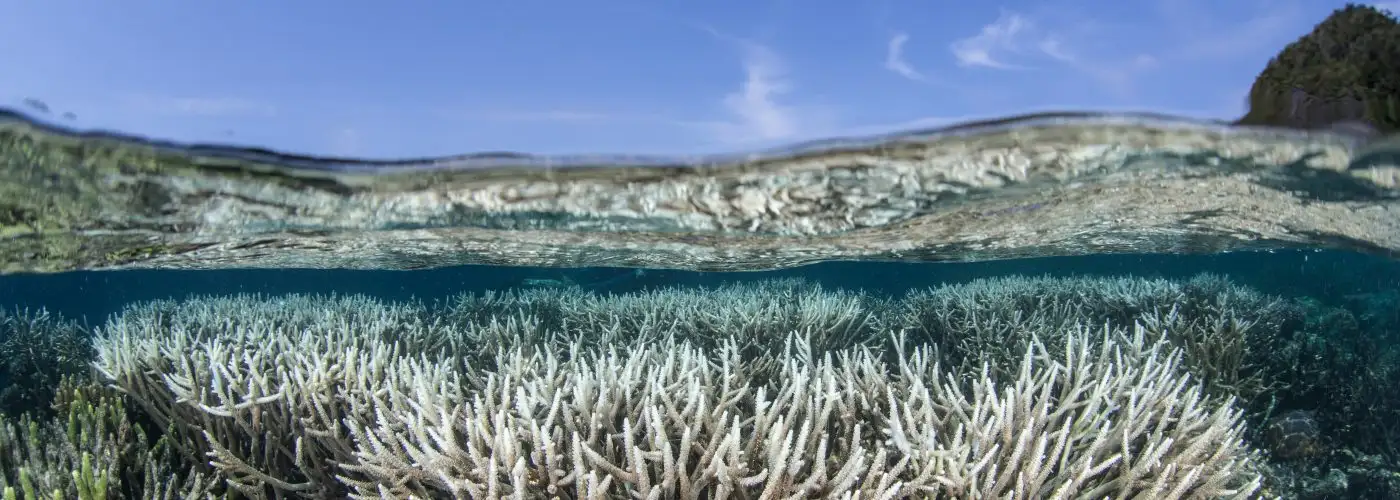Have you ever gone for a dip at a busy beach and noticed a shimmery, swirling glaze of run-off on the surface of the water?
That slick of oil on the waves is likely sunscreen, which has an active ingredient that can be toxic to ocean life. But despite 2015 findings that prove this, most travelers still seem unaware that protecting themselves from the sun is taking a toll on the world’s coral reefs. When stocking up on sunscreen for your upcoming summer beach trips, there’s more to think about than just SPF when it comes to responsibly choosing your go-to sunscreen.
What Sunscreen Does to Oceans
Your sunscreen could be harming marine life in a big way. According to the Archives of Environmental Contamination and Toxicology, the main ingredient in sunscreens called oxybenzone is damaging coral reefs. The study credits “swimmers and municipal, residential, and boat/ship wastewater discharges” with putting oxybenzone in our oceans, and likens the harmful effects oxybenzone has on coral DNA to that of gasoline.
“[Oxybenzone] causes weird deformities in soft tissue and also causes the coral larvae to encase itself in its own skeleton, in its own coffin,” one of the study’s authors, Craig Downs, P.h.D., told the Guardian. The scientist also noted that dead coral, or “zombie reefs,” were much more common in Caribbean bays frequented by tourists, while less-touristy waters of the Caribbean still had healthy reefs.
“In one [bay] there’s just nothing there, it’s a desolate wasteland,” he said. “Two bays over, at a $1,000-a-night resort, where very few people go, there’s lots of coral recruitment, lots of spiny sea urchins.” Downs has also said, “about 90 percent of the reefs in the Caribbean have disappeared since 1980.”
Sound familiar? Coral bleaching has been making headlines in the past few years for destroying large parts of the Great Barrier Reef. Oxybenzone is charged with contributing to coral bleaching (which is also exacerbated by warming oceans) as it damages adult coral but also deforms and kills baby coral, so reefs are less able to regenerate.
Between 6,000 and 14,000 tons of sunscreen end up in reef areas each year, Reuters reports. Hawaii and the Caribbean reportedly have oxybenzone water levels that are 12 times higher than the average amount. But swimmers can attempt to stop the damage they’ve done by making a quick switch in their skincare.
How to Find Responsible Sunscreen
Luckily, environmentally-friendly sunscreen is becoming easier to find. Rub-in sunscreens (not spray) with active ingredients like zinc oxide or titanium oxide, both of which are biodegradable, are best. However, not all sunscreen manufacturers are being honest in their marketing: Some sunscreens labeled “reef-friendly” still contain oxybenzone. Use the same rule of thumb encouraged by doctors and nutritionists when it comes to foods that are labeled as “healthy” and make sure you read the ingredient list to check that oxybenzone isn’t listed if you’re looking for a more responsible sunscreen.
And some nature reserves, resorts, and even entire destinations are banning certain types of sunscreens from their bays. Key West, Florida, the state of Hawaii, and Mexico’s Cabo Pulmo National Marine Park have all moved to require visitors to use only biodegradable sunscreen. With other tourist-frequented destinations likely to follow suit, your best bet is to make the switch now. To learn more, see 5 Places with Sunscreen Bans, and What You Need to Know.
-
More from SmarterTravel:
- 8 Ways to See Wildlife Responsibly When You Travel
- 7 Bucket-List Worthy Ways to Experience Ecotourism in Costa Rica
- Waves of Trash Are Taking Over These Hong Kong Beaches
SmarterTravel Editor Shannon McMahon is a former news reporter who writes about all things travel. Follow her on Twitter and Instagram.
We hand-pick everything we recommend and select items through testing and reviews. Some products are sent to us free of charge with no incentive to offer a favorable review. We offer our unbiased opinions and do not accept compensation to review products. All items are in stock and prices are accurate at the time of publication. If you buy something through our links, we may earn a commission.
Related
Top Fares From
Today's Top Travel Deals
Brought to you by ShermansTravel
France: 8-Night Paris, Avignon & Nice...
Infinity Worldwide Vacations
 vacation
$2880+
vacation
$2880+
Poconos: 3 Nts in Garden of...
ResortsAndLodges.com
 hotel
$305+
hotel
$305+
7-Nt Canada & New England Cruise,...
Princess Cruises
 cruise
$839+
cruise
$839+




